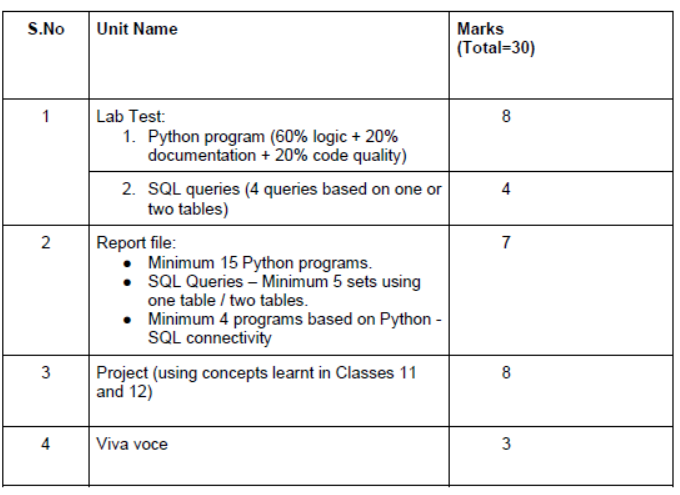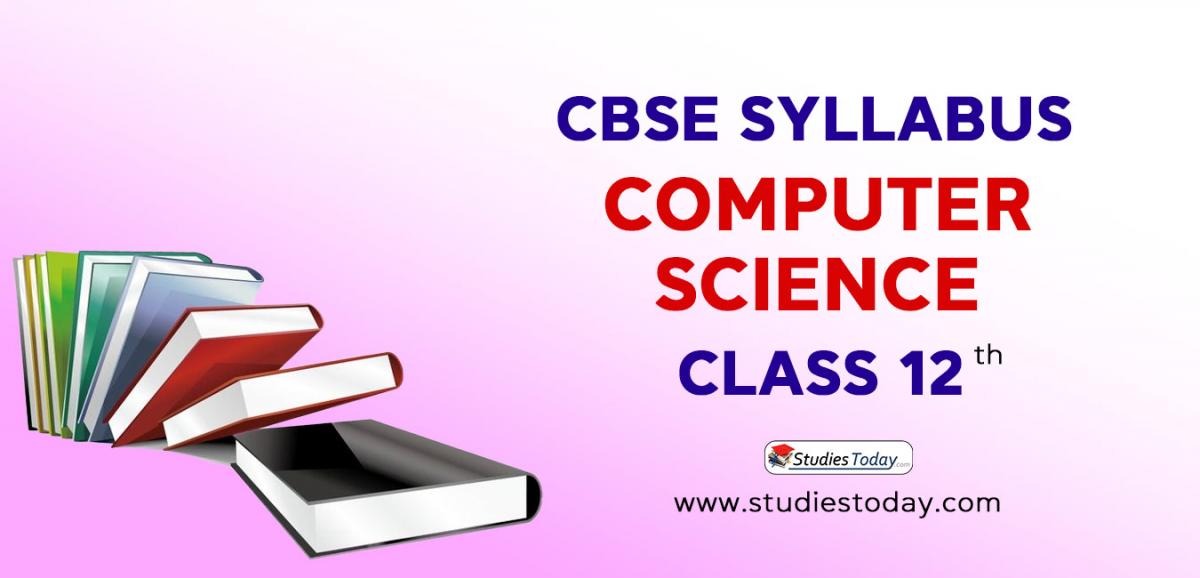Download CBSE Class 12 Syllabus for Computer Science 2023 2024. Refer to the latest syllabus provided below and free download latest curriculum of Class 12 for Computer Science issued by CBSE and NCERT, free download in pdf, get topic wise weightage, suggested readings and books based on latest syllabus and guidelines. The Computer Science Class 12 Syllabus curriculum has been developed and issued by CBSE and NCERT for Computer Science in Class 12. All students studying in Class 12 are suggested to go through latest syllabus to ensure that their preparation is as per the latest syllabus issued by CBSE NCERT KVS. Class 12 Computer Science students should do preparation for Computer Science exam strictly based on the latest curriculum and concentrate more on the topics with higher weightage to help them score higher marks in Class 12 Computer Science class tests and exams
Class 12 Computer Science Syllabus
It is important for students to study as per the latest Class 12 Computer Science curriculum and marks breakup as per important topics. This will help to prepare properly for the upcoming examination. You can click on the following links to download the latest and past year syllabus provided by us below.
Year Wise Computer Science Syllabus Class 12
Computer Science
CLASS-XII
Code No. 083
2023-24
1. Prerequisites
Computer Science- Class XI
2. Learning Outcomes
Student should be able to
a) apply the concept of function.
b) explain and use the concept of file handling.
c) use basic data structure: Stacks
d) explain basics of computer networks.
e) use Database concepts, SQL along with connectivity between Python and SQL.
3. Distribution of Marks:
Unit No. Unit Name Marks Periods
Theory Practical
I Computational Thinking 40 70 50
and Programming – 2
II Computer Networks 10 15 …
III Database Management 20 25 20
Total 70 110 70
4. Unit wise Syllabus
Unit I: Computational Thinking and Programming – 2
● Revision of Python topics covered in Class XI.
● Functions: types of function (built-in functions, functions defined in module, user defined functions), creating user defined function, arguments and parameters, default parameters, positional parameters, function returning value(s), flow of execution, scope of a variable (global scope, local scope)
● Exception Handling: Introduction, handling exceptions using try-except-finally blocks
● Introduction to files, types of files (Text file, Binary file, CSV file), relative and absolute paths
● Text file: opening a text file, text file open modes (r, r+, w, w+, a, a+), closing a text file, opening a file using with clause, writing/appending data to a text file using write() and writelines(), reading from a text file using read(), readline() and readlines(), seek and tell methods, manipulation of data in a text file
● Binary file: basic operations on a binary file: open using file open modes (rb, rb+, wb, wb+, ab, ab+), close a binary file, import pickle module, dump() and load() method, read, write/create, search, append and update operations in a binary file
● CSV file: import csv module, open / close csv file, write into a csv file using writer(),writerow(),writerows() and read from a csv file using reader()
● Data Structure: Stack, operations on stack (push & pop), implementation of stack using list.
Unit II: Computer Networks
● Evolution of networking: introduction to computer networks, evolution of networking (ARPANET, NSFNET, INTERNET)
● Data communication terminologies: concept of communication, components of data communication (sender,receiver, message, communication media, protocols), measuring capacity of communication media (bandwidth, data transfer rate), IP address, switching techniques (Circuit switching, Packet switching)
● Transmission media: Wired communication media (Twisted pair cable, Co-axial cable, Fiber-optic cable), Wireless media (Radio waves, Micro waves, Infrared waves)
● Network devices (Modem, Ethernet card, RJ45, Repeater, Hub, Switch, Router, Gateway, WIFI card)
● Network topologies and Network types: types of networks (PAN, LAN, MAN, WAN), networking topologies (Bus, Star, Tree)
● Network protocol: HTTP, FTP, PPP, SMTP, TCP/IP, POP3, HTTPS, TELNET, VoIP
● Introduction to web services: WWW, Hyper Text Markup Language (HTML), Extensible Markup Language (XML), domain names, URL, website, web browser, web servers, web hosting
Unit III: Database Management
● Database concepts: introduction to database concepts and its need
● Relational data model: relation, attribute, tuple, domain, degree, cardinality, keys (candidate key, primary key, alternate key, foreign key)
● Structured Query Language: introduction, Data Definition Language and Data Manipulation Language, data type (char(n), varchar(n), int, float, date), constraints (not null, unique, primary key), create database, use database, show databases, drop database, show tables, create table, describe table, alter table (add and remove an attribute, add and remove primary key), drop table, insert, delete, select, operators (mathematical, relational and logical), aliasing, distinct clause, where clause, in, between, order by, meaning of null, is null, is not null, like, update command, delete command, aggregate functions (max, min, avg, sum, count), group by, having clause, joins: cartesian product on two tables, equi-join and natural join
● Interface of python with an SQL database: connecting SQL with Python, performing insert, update, delete queries using cursor, display data by using connect(), cursor(), execute(), commit(), fetchone(), fetchall(), rowcount, creating database connectivity applications, use of %s format specifier or format() to perform queries
5. Practical

6. Suggested Practical List:
Python Programming
● Read a text file line by line and display each word separated by a #.
● Read a text file and display the number of vowels/consonants/uppercase/lowercase characters in the file.
● Remove all the lines that contain the character 'a' in a file and write it to another file.
● Create a binary file with name and roll number. Search for a given roll number and display the name, if not found display appropriate message.
● Create a binary file with roll number, name and marks. Input a roll number and update the marks.
● Write a random number generator that generates random numbers between 1 and 6 (simulates a dice).
● Write a Python program to implement a stack using list.
● Create a CSV file by entering user-id and password, read and search the password for given userid.
Database Management
● Create a student table and insert data. Implement the following SQL commands on the student table:
o ALTER table to add new attributes / modify data type / drop attribute
o UPDATE table to modify data
o ORDER By to display data in ascending / descending order
o DELETE to remove tuple(s)
o GROUP BY and find the min, max, sum, count and average
● Similar exercise may be framed for other cases.
● Integrate SQL with Python by importing suitable module.
7. Suggested Reading Material
● NCERT Textbook for COMPUTER SCIENCE (Class XII)
● Support Materials on the CBSE website.
8. Project
The aim of the class project is to create something that is tangible and useful using Python file handling/ Python-SQL connectivity. This should be done in groups of two to three students and should be started by students at least 6 months before the submission deadline. The aim here is to find a real world problem that is worthwhile to solve.
Students are encouraged to visit local businesses and ask them about the problems that they are facing. For example, if a business is finding it hard to create invoices for filing GST claims, then students can do a project that takes the raw data (list of transactions), groups the transactions by category, accounts for the GST tax rates, and creates invoices in the appropriate format. Students can be extremely creative here. They can use a wide variety of Python libraries to create user friendly applications such as games, software for their school, software for their disabled fellow students, and mobile applications, of course to do some of these projects, some additional learning is required; this should be encouraged. Students should know how to teach themselves.
The students should be sensitized to avoid plagiarism and violations of copyright issues while working on projects. Teachers should take necessary measures for this.
You can download the CBSE 2025 Syllabus for Class 12 Computer Science for latest session from StudiesToday.com
Yes, you can click on the links above and download Syllabus in PDF for Class 12 for Computer Science
Yes, the syllabus issued for Class 12 Computer Science have been made available here for latest 2025 academic session
You can easily access the links above and download the Class 12 Syllabus Computer Science
There is no charge for the Syllabus for Class 12 CBSE Computer Science you can download everything free
Planning your studies as per syllabus given on studiestoday for Class 12 subject Computer Science can help you to score better marks in exams
Yes, studiestoday.com provides all latest CBSE Class 12 Computer Science Syllabus with suggested books for current academic session
Yes, studiestoday provides curriculum in Pdf for Class 12 Computer Science in mobile-friendly format and can be accessed on smartphones and tablets.
Yes, syllabus for Class 12 Computer Science is available in multiple languages, including English, Hindi


